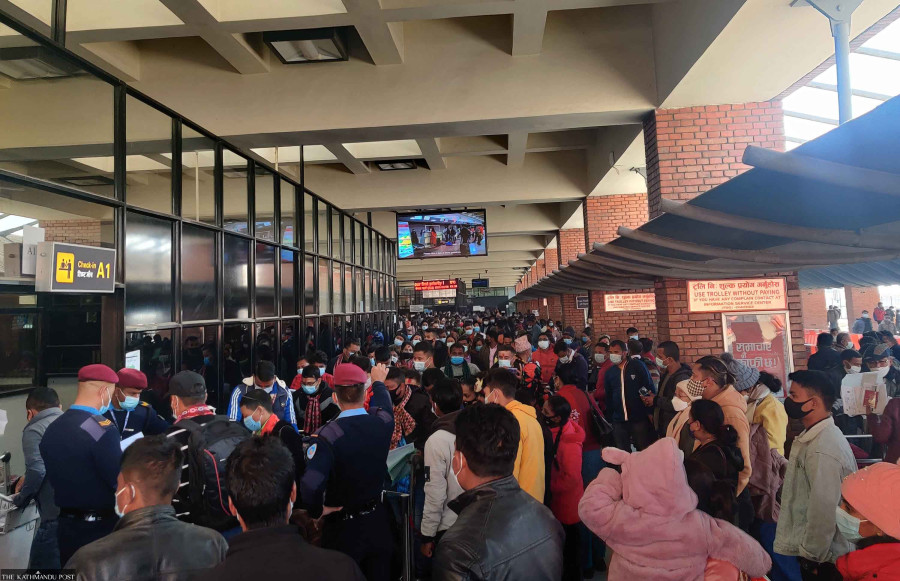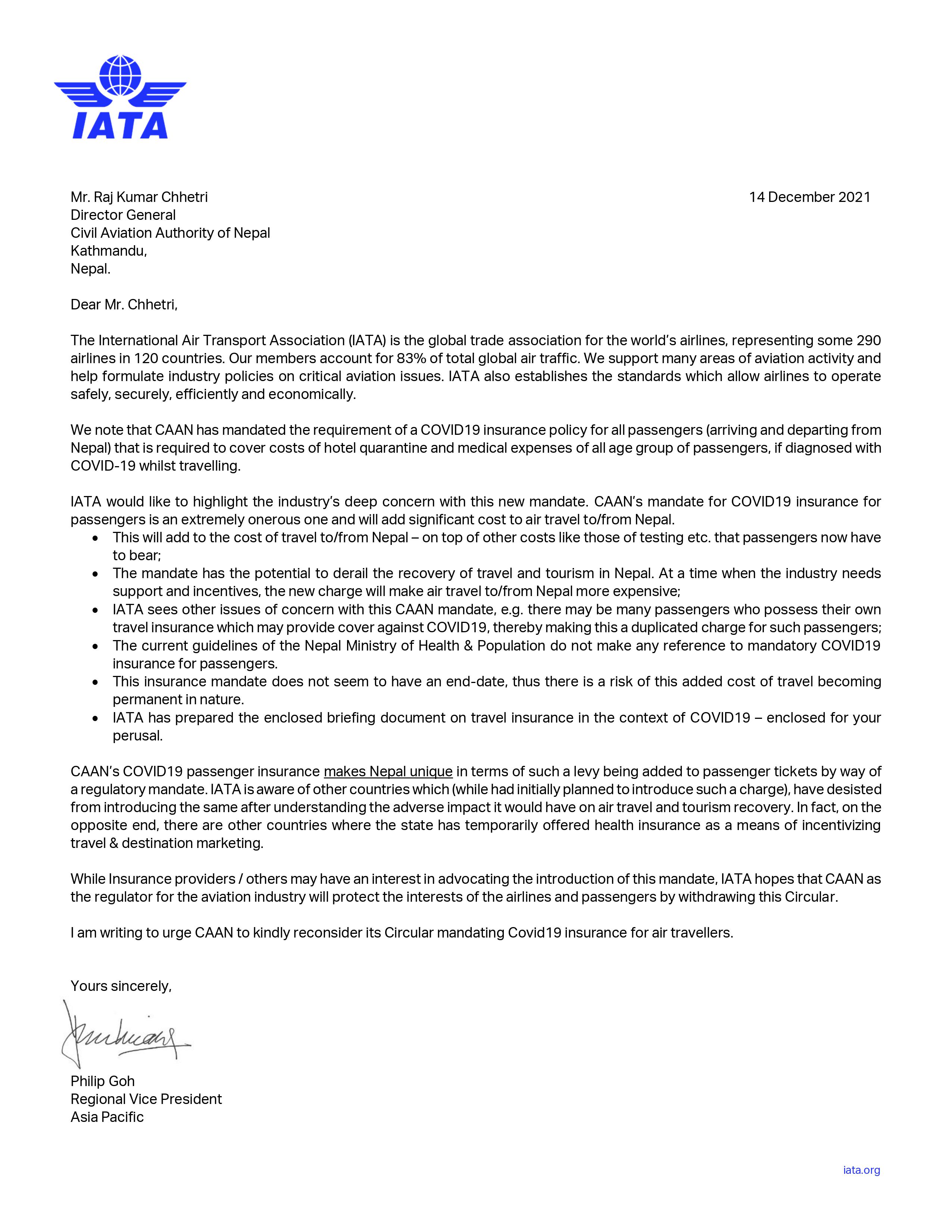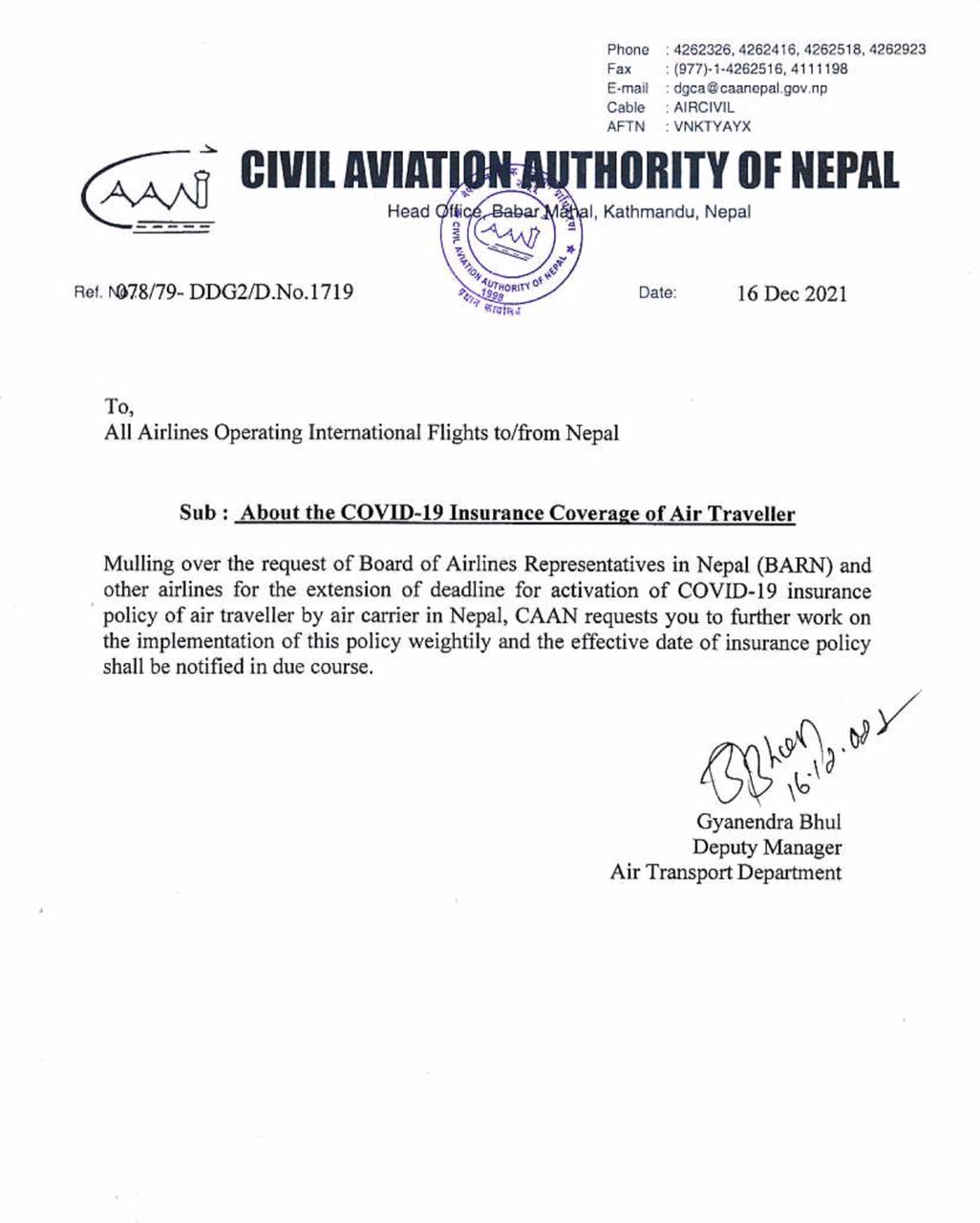Money
Covid insurance requirement put on hold after airlines ask for time
According to the Civil Aviation Authority of Nepal, airlines—not the passengers—have to pay for the proposed insurance policy.
Sangam Prasain
Nepal’s civil aviation regulator has postponed the implementation of a mandatory Covid-19 insurance policy for travellers flying to and from Kathmandu after international airlines asked for extra time to make preparations.
On December 3, the Civil Aviation Authority of Nepal had passed a decision to enforce the Covid-19 insurance policy from December 15 and informed all carriers serving Kathmandu’s Tribhuvan International Airport accordingly.
Issuing a circular to all international airlines, the authority urged them to activate the Covid-19 insurance policy for all travellers passing through Nepal. The policy covers hotel quarantine costs up to 14 days and medical expenses up to $5,000 for all age groups of passengers if they are diagnosed with Covid-19 whilst travelling.
The International Air Transport Association (IATA) responded to the directive with a strongly-worded letter to Nepal’s civil aviation regulator, indirectly charging that insurance providers may have an interest in advocating the introduction of this mandate.
In a December 14 letter addressed to Raj Kumar Chhetri, director general of the Civil Aviation Authority of Nepal, the global trade association for the world’s airlines, representing some 290 airlines in 120 countries, stated that Nepal’s new Covid-19 insurance for passengers was “an extremely onerous one”.
In the letter, a copy of which the Post has obtained, IATA said that the insurance policy would add a significant cost to air travel to and from Nepal.
“We have decided to extend the time. This extension will give airlines some additional breathing space to prepare and fully comply with the rule,” said Gyanendra Bhul, deputy manager at the Air Transport Department of the Civil Aviation Authority of Nepal.

The decision to postpone the plan follows a meeting with the Board of Airline Representatives of Nepal. On Thursday, the Civil Aviation Authority of Nepal issued a new circular informing all airlines that the plan had been postponed indefinitely.
The notice issued by the authority says, “Mulling over the request of the Board of Airlines Representatives in Nepal and other airlines for the extension of the deadline for activation of the Covid-19 insurance policy of air traveller by the air carrier in Nepal, CAAN requests you to further work on the implementation of this policy weightily, and the effective date of the insurance policy shall be notified in due course."
“We discussed the issue with the Insurance Board, the insurance regulatory authority of Nepal, on Thursday morning to prepare the guideline so that there is no duplication,” said Bhul.
“If passengers are covered by other insurance policies like Covid-19 health insurance or other travel insurance and their medical expenses are covered, the airlines don’t have to insure them again,” said Bhul.
“This policy is for passengers who don’t have any insurance that covers their medical expenses,” he said.
Some airlines have been charging travellers a premium.
“During the meeting, airline operators said they were positive about enforcing the new rule, but they have sought time to prepare,” said Bhul.
A representative of an international airline told the Post that they were positive about enforcing the Covid-19 insurance policy, and were waiting for a “clear cut” guideline from Nepal’s civil aviation authority.
A clear cut guideline means there should be no duplication of the insurance policy. “It should be clear who should be covered and who should not,” the unnamed official said.
“The insurance policy will increase the confidence of passengers as well as airlines because passengers know that they are insured in case they become infected while travelling,” the official said.
How much of a burden the new policy will cause is unknown, but an international airline official said that a seven-day travel policy to visit Europe would cost Rs4,000. “The Covid-19 insurance policy starts from one airport and ends at another airport, so the cost should not be significantly high. It depends on the travel time too.”
According to the Civil Aviation Authority of Nepal, airlines have to pay for the proposed insurance policy, not the passengers.
The policy will not affect travel agencies and passengers because the entire responsibility for the expenses of the passengers (hotel quarantine cost up to 14 days and medical expenses up to $5,000) will lie with the airlines if their passengers get infected while travelling.
IATA has urged Nepal’s civil aviation regulator to withdraw the circular in order to protect the interests of airlines and passengers.
This will add to the cost of travel to and from Nepal, on top of other costs like those of testing that passengers now have to bear, IATA said.
“The mandate has the potential to derail the recovery of travel and tourism in Nepal. At a time when the industry needs support and incentives, the new charge will make air travel to/from Nepal more expensive.”
IATA said there may be many passengers who possess their own travel insurance which may provide cover against Covid-19, thereby making this a duplicated charge for such passengers.
The current guidelines of Nepal's Ministry of Health and Population do not make any reference to mandatory Covid-19 insurance for passengers, it said. “This insurance mandate does not seem to have an end-date, thus there is a risk of this added cost of travel becoming permanent in nature.”
IATA said that there were other countries where the state has temporarily offered health insurance as a means of incentivising travel and destination marketing.
“While insurance providers/others may have an interest in advocating the introduction of this mandate, IATA hopes that CAAN as the regulator for the aviation industry will protect the interests of the airlines and passengers by withdrawing this Circular.”
An official at the civil aviation regulator told the Post that IATA's strongly-worded letter was against Nepal’s sovereignty, and it should not interfere with the country’s internal laws.
Nepal had enforced Covid-19 insurance before, but for mountaineers and trekkers only.
Earlier, trekkers and mountaineers arriving in Nepal were required to undergo mandatory seven-day hotel quarantine, and have a second negative PCR test on the fifth day after arrival. The government had made it mandatory for trekkers and mountaineers to possess insurance coverage worth $5,000.

However, on September 23, Nepal threw away the seven-day quarantine requirement and resumed issuing on-arrival visas to all vaccinated foreign travellers in a bid to bring its virus-ravaged tourism industry back to life. The insurance requirement was also removed.
Visitors should have received their last dose of the Covid-19 vaccine at least 14 full days prior to entering Nepal.
Those who are not vaccinated or partially vaccinated will not get on-arrival visas. They have to get their entry permits from Nepali diplomatic missions, and also spend 10 days in quarantine in government-listed hotels.
A negative RT-PCR or Gene Expert or True NAAT test is required for all to travel to Nepal.
The new protocol was issued under the Infectious Disease Act 1964, after the Covid-19 Crisis Management Ordinance 2020, along with around a dozen ordinances, introduced by the government, became ineffective from September 16 when they failed to get through Parliament within the constitutional deadline.
The world is again dealing with a new variant of the novel coronavirus, this time called Omicron.
Many countries swiftly imposed border restrictions and flight bans to buy some time as scientists try to decipher this new variant’s implications for public health.
The first confirmed Covid-19 case with the Omicron variant—identified as B.1.1.529—dates from November 11 in Botswana.
South African scientists detected a small number of the variant in samples collected between November 14 and 16, prompting them to report their findings to the World Health Organisation on November 24.
On November 26, the WHO declared Omicron a SARS-CoV-2 variant of concern.
Following the development, effective from December 2, Nepal issued travel restrictions for people arriving from South Africa, Hong Kong, Zimbabwe, Botswana, Namibia, Lesotho, Eswatini, Malawi and Mozambique as the first port of embarkation or transit or with a travel history of such countries within the past three weeks.
So far, Nepal has reported two Omicron cases.




 11.84°C Kathmandu
11.84°C Kathmandu













